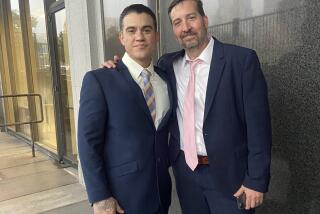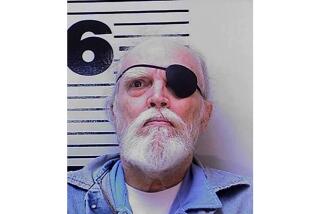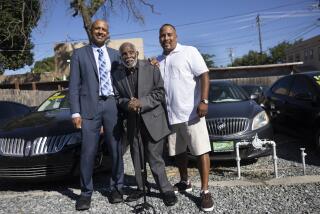Death for Murderer Who Stalked Gay Bars Affirmed : Justice: State Supreme Court says use of hypnotized witness, though improper, did not bar use of other evidence.
SAN FRANCISCO — The state Supreme Court affirmed the death penalty Monday of a man convicted in the bludgeon-slayings of four men he met in homosexual bars and lured to their deaths in West Hollywood and Silver Lake in 1980 and 1981.
The justices unanimously turned down an appeal by Donald Miller, 49, a former welder and convicted robber who was also found guilty of attempting to murder four other men in similar assaults.
The high court acknowledged that jurors had improperly been allowed to hear testimony from a key prosecution witness who identified Miller as a suspect after being hypnotized to refresh his memory.
The justices cited a landmark 1982 ruling sharply limiting testimony from witnesses who previously had undergone hypnosis--a process they said then was unreliable and lacked sufficient scientific acceptance. But the 1982 decision did not bar the use of other evidence uncovered by investigators, they noted.
The court went on to hold that in this case, there was separate, properly admitted proof that implicated Miller as the killer--and thus it was not “reasonably probable” the erroneously admitted testimony affected the verdict.
The overall evidence, Justice David N. Eagleson wrote, showed “that the defendant kept a pipe in his car for use as a weapon and that on four separate occasions he met men in gay bars, invited them to his car for marijuana or sex, drove them to nearby side streets and without warning struck them on the head with a pipe and killed them.”
Miller was convicted and sentenced to death in Los Angeles Superior Court in 1983 for the murders of Michael Thomas, 32; Robert Sanderson, 26; Danny Harmon, 23, and Ernesto Ramirez, 28.
A key role was played by a witness, Mario Aguirre, who had seen his friend Ramirez leaving a bar with an unidentified black male. After Ramirez had been attacked and lay unconscious in a hospital, another acquaintance arranged for Aguirre to be hypnotized and help a police artist, working privately, come up with a composite drawing of the unidentified man that would be distributed in homosexual bars.
Police investigators later became aware of Aguirre’s role as a witness and they persuaded him to join them in a stakeout at the bar where Ramirez had been seen with the unidentified man. As they approached the bar, a man crossed the street toward them and Aguirre shouted, “That’s him!” The man turned and walked away quickly, but was chased and caught by police.
Police identified the suspect as Miller and found a metal pipe in his car. In subsequent investigations, authorities charged Miller with the four murders and the attempted murders of four other men, three of whom identified him as their assailant.
After he was convicted, Miller told jurors at the penalty phase of the trial that he was not guilty. Although he did not ask for the death penalty, he told jurors that he did not want to be sentenced to the alternative under state law: life in prison without parole.
In his appeal to the state Supreme Court, an attorney for Miller argued that his client’s conviction and sentence should be overturned because of the erroneous admission of Aguirre’s testimony. The entire case had been tainted by Aguirre’s improper hypnosis-assisted testimony and the high court should order a retrial, the lawyer said.
The justices rejected Miller’s claim, pointing to the separate, properly admitted evidence implicating him in the attacks.
More to Read
Sign up for Essential California
The most important California stories and recommendations in your inbox every morning.
You may occasionally receive promotional content from the Los Angeles Times.










